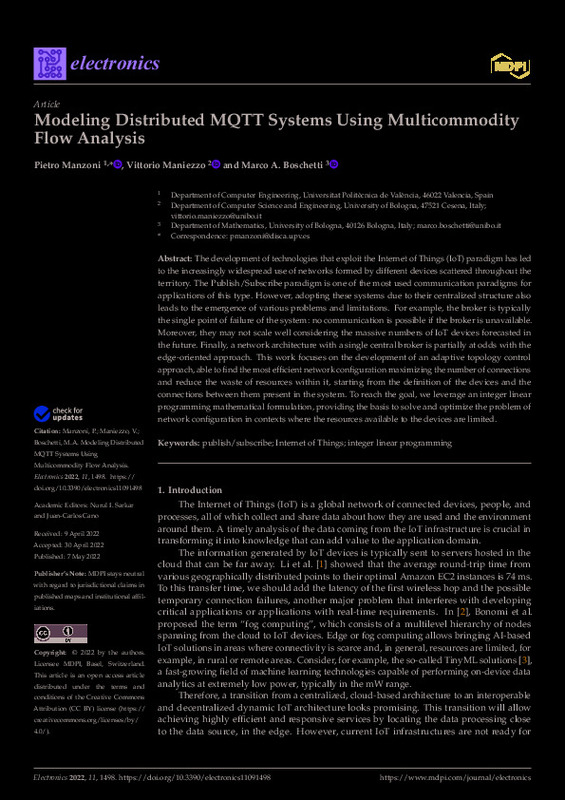JavaScript is disabled for your browser. Some features of this site may not work without it.
Buscar en RiuNet
Listar
Mi cuenta
Estadísticas
Ayuda RiuNet
Admin. UPV
Modeling Distributed MQTT Systems Using Multicommodity Flow Analysis
Mostrar el registro sencillo del ítem
Ficheros en el ítem
| dc.contributor.author | Manzoni, Pietro
|
es_ES |
| dc.contributor.author | Maniezzo, Vittorio
|
es_ES |
| dc.contributor.author | Boschetti, Marco A.
|
es_ES |
| dc.date.accessioned | 2023-05-08T18:02:02Z | |
| dc.date.available | 2023-05-08T18:02:02Z | |
| dc.date.issued | 2022-05 | es_ES |
| dc.identifier.uri | http://hdl.handle.net/10251/193210 | |
| dc.description.abstract | [EN] The development of technologies that exploit the Internet of Things (IoT) paradigm has led to the increasingly widespread use of networks formed by different devices scattered throughout the territory. The Publish/Subscribe paradigm is one of the most used communication paradigms for applications of this type. However, adopting these systems due to their centralized structure also leads to the emergence of various problems and limitations. For example, the broker is typically the single point of failure of the system: no communication is possible if the broker is unavailable. Moreover, they may not scale well considering the massive numbers of IoT devices forecasted in the future. Finally, a network architecture with a single central broker is partially at odds with the edge-oriented approach. This work focuses on the development of an adaptive topology control approach, able to find the most efficient network configuration maximizing the number of connections and reduce the waste of resources within it, starting from the definition of the devices and the connections between them present in the system. To reach the goal, we leverage an integer linear programming mathematical formulation, providing the basis to solve and optimize the problem of network configuration in contexts where the resources available to the devices are limited. | es_ES |
| dc.description.sponsorship | This work is derived from R&D project RTI2018-096384-B-I00, funded by MCIN/AEI/10.13039/501100011033 and "ERDF A way of making Europe", and by the European Union's Horizon 2020 research and innovation programme under grant agreement No. 101017861. | es_ES |
| dc.language | Inglés | es_ES |
| dc.publisher | MDPI AG | es_ES |
| dc.relation.ispartof | Electronics | es_ES |
| dc.rights | Reconocimiento (by) | es_ES |
| dc.subject | Publish/subscribe | es_ES |
| dc.subject | Internet of Things | es_ES |
| dc.subject | Integer linear programming | es_ES |
| dc.subject.classification | ARQUITECTURA Y TECNOLOGIA DE COMPUTADORES | es_ES |
| dc.title | Modeling Distributed MQTT Systems Using Multicommodity Flow Analysis | es_ES |
| dc.type | Artículo | es_ES |
| dc.identifier.doi | 10.3390/electronics11091498 | es_ES |
| dc.relation.projectID | info:eu-repo/grantAgreement/AEI/Plan Estatal de Investigación Científica y Técnica y de Innovación 2017-2020/RTI2018-096384-B-I00/ES/SOLUCIONES PARA UNA GESTION EFICIENTE DEL TRAFICO VEHICULAR BASADAS EN SISTEMAS Y SERVICIOS EN RED/ | es_ES |
| dc.relation.projectID | info:eu-repo/grantAgreement/EC/H2020/101017861/EU | es_ES |
| dc.rights.accessRights | Abierto | es_ES |
| dc.contributor.affiliation | Universitat Politècnica de València. Escola Tècnica Superior d'Enginyeria Informàtica | es_ES |
| dc.description.bibliographicCitation | Manzoni, P.; Maniezzo, V.; Boschetti, MA. (2022). Modeling Distributed MQTT Systems Using Multicommodity Flow Analysis. Electronics. 11(9):1-18. https://doi.org/10.3390/electronics11091498 | es_ES |
| dc.description.accrualMethod | S | es_ES |
| dc.relation.publisherversion | https://doi.org/10.3390/electronics11091498 | es_ES |
| dc.description.upvformatpinicio | 1 | es_ES |
| dc.description.upvformatpfin | 18 | es_ES |
| dc.type.version | info:eu-repo/semantics/publishedVersion | es_ES |
| dc.description.volume | 11 | es_ES |
| dc.description.issue | 9 | es_ES |
| dc.identifier.eissn | 2079-9292 | es_ES |
| dc.relation.pasarela | S\466765 | es_ES |
| dc.contributor.funder | European Commission | es_ES |
| dc.contributor.funder | Agencia Estatal de Investigación | es_ES |
| dc.contributor.funder | European Regional Development Fund | es_ES |








